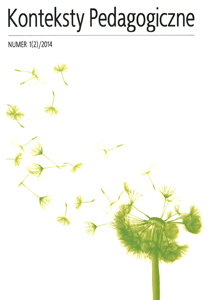Abstract
A word (a language) is, since the early years of life, a tool of active and participative citizenship, understood as the ability to give a word and meaning to the world.The article analyzes works of Freire, Don Milani, Rodari, who in various ways emphasize that mastering a language is also social competence. Reasuming, words are for a child „a poetic toy” through he or she speaks, plays, thinks, communicates, relates himself or herself, imagines and creates.
References
Beccaria G.L., Il mare in un imbuto,Torino 2010.
Bruner J., Il linguaggio del bambino. Come il bambino impara ad usare il linguaggio, Roma 1999.
Caselli M.C., Pasqualetti P., Stefanini S., Parole e frasi nel „primo vocabolario del bambino”, Milano 2007.
Don Milani, Chiamo uomo chi è padrone della sua lingua,[w:] La lingua italiana oggi: un problema scolastico e sociale, ed. L. Renzi, M. Cortellazzo, Bologna 1977.
Don Milani, Lettera a una professoressa, Firenze 1967.
Fink E., Il gioco come simbolo del mondo, Firenze 1991.
Fioril E.M., Imparare a parlare. Il metodo di alfabetizzazione di Paulo Freire, [w:] P.Freire La pedagogia degli oppressi, Torino 2004.
Frabboni F., Pinto Minerva F., Trebisacce G., La scuola degli alfabeti, Firenze 1990.
Freire P., La pedagogia degli oppressi, Torino 2004.
La lingua italiana oggi: un problema scolastico e sociale, ed. L. Renzi, M. Cortellazzo,Bologna 1977.
Manuzzi P., Pedagogia del gioco e dell’animazione, Milano 2002.
Milan G., L’educazione come dialogo. Riflessioni sulla pedagogia di Paulo Freire, „Studium Educationis”, Erickson, Trento luty 2008, vol. 1, no. 1.
Pinto Minerva F., Frabboni F., La scuola dell’infanzia, Roma–Bari 2008.
Raccontare ancora. La scrittura e l’editoria per ragazzi. Vita e pensiero,ed.S.Blezza, Milano 2007.
Rodari G., Esercizi di fantasia, Roma 1981.
Rodari G., Grammatica della fantasia, Trieste 2010.
Rodari G., Il secondo libro delle filastrocche, Torino 1996.
Rodari G., Perché ho dedicato il mio ultimo libro alla città di Reggio Emilia, Konferencja z 17 kwietnia 1974 r. w Reggio Emilia,http://www.rodaricentrostudiorvieto.org/site/9894/default [dostęp: 13.08.2013].
Spitz R.A., Dialoghi dall’infanzia. Raccolta di scritti, Roma 2000.http://www.giscel.org/dieciTesi.htm [dostęp: 13.08.2013].
In accordance with the recommendation of the Ministry of Science and Higher Education, which aims to counteract the practice of “ghostwriting” and “guest authorship,” all authors submitting their text for publication should attach an author’s statement which declares the contribution of each of the authors to the article. The printed and signed statement should be delivered by mail or other means to editor-in-chief Joanna Skibska or sent in the form of a scan to the following e-mail address: redakcja@kontekstypedagogczne.pl. The authors will not receive remuneration for publishing their papers. The editors reserve the right to make minor editorial changes to the articles which will not affect the substance of the article. We encourage all authors to prepare their articles in accordance with the guidelines for manuscript preparation. Download pdf file.
Authors transfer all copyrights and grant the journal the right of first publication with the work simultaneously licensed under a Creative Commons Attribution License that allows others to share the work with acknowledgement of the work's authorship and initial publication in this journal. All authors agree to the publishing of their email addresses, affiliations and short bio statements with their articles during the submission process.

